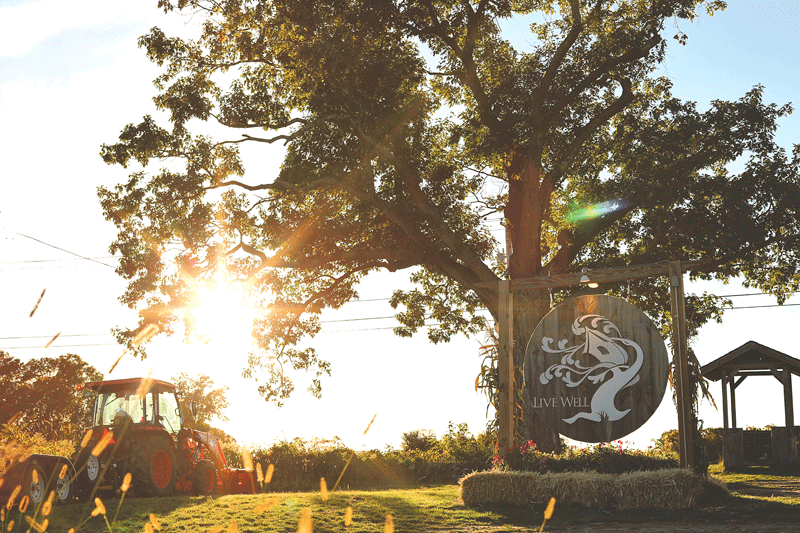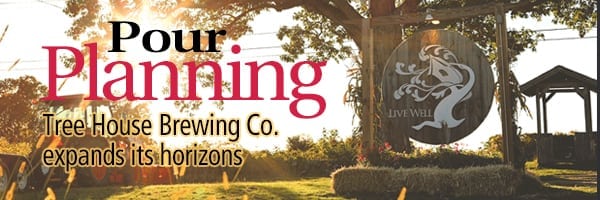
Tree House Brewing Co. Expands Its Horizons
Pour Planning
It’s one of the region’s most unlikely success stories — a brewery that doesn’t distribute its beers beyond the building where they’re crafted, yet has managed to amass a passionate following of enthusiasts who wait in long lines to buy that week’s selections. From humble beginnings in a Brimfield barn, Monson-based Tree House Brewing Co. will make its second big move later this year, into a 55,000-square-foot brewery in Charlton, which will dramatically expand its capacity, raise its profile, and put smiles on the faces of a lot more thirsty people.
It’s called Julius, and it’s a different type of IPA beer.
“Julius is a beer that is near and dear to our heart, both because we love it and because it is the embodiment of our identity: a brewery that makes carefully crafted, brightly flavored, contemplative, and pleasant-to-drink malt beverages,” said Nate Lanier, co-founder and head brewer at Tree House Brewing Co.
Describing it as robustly flavored, with notes of citrus, papaya, and mango, Lanier said Julius is typically available year-round at Tree House’s headquarters on Koran’s Farm in the rolling hills of Monson. “If you’re used to light-beer flavors, drinking a Julius will be a shock to the palate — in the most lovely way imaginable.”
No wonder, then, that the day BusinessWest visited, the line to purchase cans of Julius and other ales stretched a football field’s length from the door of the barn that currently houses the brewery’s entire production and retail space (but not for long; more on that later). In fact, fans surge into the farm’s parking lot and brave those sometimes hour-long lines every time the doors open to the public, like zealous fans who can’t find Tree House brews anywhere else.
Because they can’t.
“We’re 100% sold out of this building, and that is uncommon,” said Dean Rohan, one of the brewery’s three co-founders, along with Lanier and Damien Goudreau. But it’s not strictly by design, Rohan said.
“By Saturday, there is no beer left to put on a truck and bring somewhere. We brew 340 barrels of beer a week, and we sell every single drop of it every single week.”
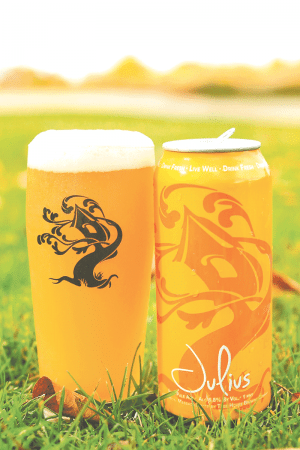
It was like nothing they’d had before. A lot of the guys out west were making big, hop-forward beers, and when Nate started brewing hop-forward beers, they were what we called ‘drinkable hops’ — they weren’t so bitter and in your face. People who don’t like IPAs say they like our beer.”
But the phenomenon wouldn’t exist were it not for Lanier’s wife, Lauren, who got him started in the craft of home brewing.
“He loved craft beer and would go on pilgrimages to his favorite breweries and stand in line,” Rohan said. “So she bought him a home-brewing kit as a gift. I call her the mother of this place; she started it all.”
The three knew each other through music — they’re all musicians who occasionally played together — but Tree House Brewing Co. was born from a different kind of gathering, when Lanier threw a craft-beer tasting party as his house. Everyone brought favorites, and Lanier tossed three of his own home brews into the mix; when attendees voted, his creations finished first, second, and third among some 25 selections.
That got the three of them talking about investing time and money into making beer together, which they did, in Goudreau’s backyard barn in Brimfield, after getting permission from his wife. In 2012, they applied for and received a license to sell to the public, filling growlers right from the barn.

Tree House Brewing Co. founders (from left) Damien Goudreau, Nate Lanier, and Dean Rohan say the Charlton expansion will create opportunities for growth and perhaps broader distribution.
“Our business plan said maybe if we could get 25 people to come buy our beer, we’d be able to pay off the little loan we took to buy a 12-gallon, half-barrel system,” Rohan said. “Well, those 25 people came the first day, then 50, then 75. From the day we opened our doors, we had more people than we’d expected.”
That’s a story that would be repeated again and again, resulting in a move to Monson two years ago and the ongoing development today of a much larger brewing facility in Charlton. At its heart, it’s a story about the enthusiasm shared among folks who make beer, and those who seek it out and stand in long lines to buy it.
Word of Mouth
The initial response to that tiny brewery in Brimfield — and, really, much of the marketing ever since — was driven by social media, which has long been a fertile communications network for craft brewers. Beer enthusiasts like the idea of hunting down something new and different, and Lanier had already developed a reputation for his beer.
“It was like nothing they’d had before,” Rohan said. “A lot of the guys out west were making big, hop-forward beers, and when Nate started brewing hop-forward beers, they were what we called ‘drinkable hops’ — they weren’t so bitter and in your face. People who don’t like IPAs say they like our beer.”
Unable to meet the demand from people who were driving up to the barn, the partners quickly outgrew the 12-gallon system, and approached the bank for their first big loan. The funds helped purchase a five-barrel brewhouse — a 150-gallon system — from California.
“That was going to be it,” Rohan said. “We were going to be able to make enough beer in that little barn to keep people happy. But we couldn’t do it.”
Again, simply through word of mouth and social media, beer enthusiasts continued to cram into the Brimfield site. Clearly, it was time to find larger digs.
“After about a year and a half in that neighborhood, the neighbors decided it was getting to be too much, having 125 cars driving up their agricultural, residential road in Brimfield, and rightfully so. We didn’t have an inch to grow in that barn anyway, so we came here.”

The lines to buy beer at Tree House often stretch to an hour or more.
The partners built the current brewery — a 7,000-square-foot building housing a 30-barrel brewhouse, which could pump out 13,000 barrels per year — at Koran’s Farm in Monson. During construction, they continued to sell beer out of a little red barn across the street.
“This is where we were going to retire,” Rohan said, adding that, at the very least, the farm would be the framework of a five-year plan. But, a year and a half into that plan, production still wasn’t keeping up with demand.
“We have these plans and goals for the future, and the future arrives much faster than we expect it to,” he went on. “Wait, that’s wrong — we actually expect it now.”
It was in Monson that the long-line phenomenon really took off, he added. “In the dead of winter, on days when the news people were saying, ‘coldest day of the year — stay home, don’t go out’ — we’d have 25 cars in the parking lot an hour or two before we opened.” So he started printing tickets with the line order and passing them out so people could stay warm in their cars and not lose their place.
There are benefits to selling on site only, starting with freshness, as everything patrons carry out has been very recently brewed. As the partners note on their website, people like the convenience of finding a favorite beer at the convenience store, but that convenience comes at a price. “The minute our beer leaves our loving hands, it is subjected to forces that seek to destroy it — temperature fluctuations, ultraviolet light, mistreatment, etc. These forces are especially destructive to the pale, hoppy beers we love so much.”
The no-distribution model hasn’t hindered the company’s recognition; Beer Advocate recently listed 14 of its offerings on a list of 100 favorite beers. Besides the ever-popular Julius, other brews in regular rotation include ‘That’s What She Said,’ a milk stout with elements of chocolate and coffee; ‘Sap,’ a piney IPA originally brewed as a Christmas beer; ‘Green,’ a citrus-heavy IPA with notes of pineapple, tangerine, and orange rind; and ‘Eureka,’ which boasts a delicate bouquet of passionfruit and a slight lemon flavor.
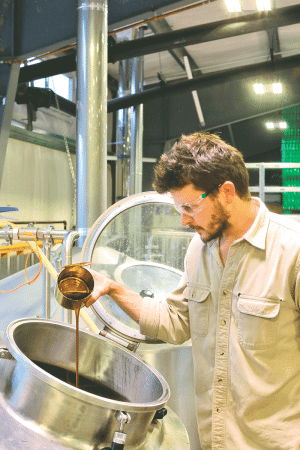
Nate Lanier crafts a brew at Tree House’s headquarters in Monson.
Occasional offerings may include ‘Tornado,’ which Lanier concocted in the aftermath of the June 2011 tornado that ripped through Monson and Brimfield, and features notes of pine, tropical fruit, and citrus; ‘Good Morning,’ which pours black in the glass with a creamy head and offers the flavors of milk chocolate, maple syrup, and coffee; and ‘Double Shot,’ a rich, decadent coffee stout.
Stay Awhile
Those beers and more will soon be brewed in Charlton — specifically, in a 55,000-square-foot brewery on a 68-acre parcel that was most recently considered for a Home Depot warehouse, and before that, a casino. Built with the help of a $7.7 million MassDevelopment bond, the facility will initially boast a 30,000-barrel annual capacity, with the potential to expand to 125,000 barrels. Customers will be able to sample beers, buy and fill growlers, and buy cans of Tree House beer.
“For the first time in our history, we will have a taproom where guests can enjoy pints and enjoy a self-guided tour from a mezzanine level of our new, state-of-the-art brewing facility,” Lanier said. “We were lucky to find an amazing property high on a hill off of Route 20 that will allow guests to explore the grounds and disconnect a bit from the world at large.”
The people who wait in line in Monson typically make their purchases and get back in their cars, as there’s no space inside for socializing. Lanier is excited that Charlton will provide that social space.
“Since our inception, we have never been able to make enough beer to keep up with demand. Charlton will solve that problem and allow us to focus more on curating a communal environment,” he said — a place where beer enthusiasts can sit, enjoy the selections, and pass time with friends.
With the much larger quantities Tree House will be able to produce in Charlton, it may be able to keep public hours every day, as opposed to the four days a week — and maybe 20 total hours — it keeps now. While the Monson facility will remain operational, both for testing new beers and probably a scaled-back retail presence, Charlton will become the main hub, potentially doubling the company’s 22 employees.
“Once we get up and running, we may even do a little bit of distribution,” Rohan said. “There are so many taps in Massachusetts that have been waiting for us to give them a keg since the first month we were open. We’d never be able to get kegs to all those bars and restaurants, and we wouldn’t be anything but hyper-local for the next five to seven years. The closer we keep the beer to us, the fresher it will be.”
He expects the long lines and early arrivals at the new facility as well, but said the phenomenon has grown to be endearing phenomenon. “We’re in awe that some people sit there for hours for no other reason than to be first or second in line.”
In a way, he told BusinessWest, customers have made themselves into a community and made new friendships over their shared passion for craft beer. “We’re seeing upwards of 5,000 people a week coming through the doors, and when I walk out and talk to the people in line — some of them have been here four or five times — I feel like we’re friends.”
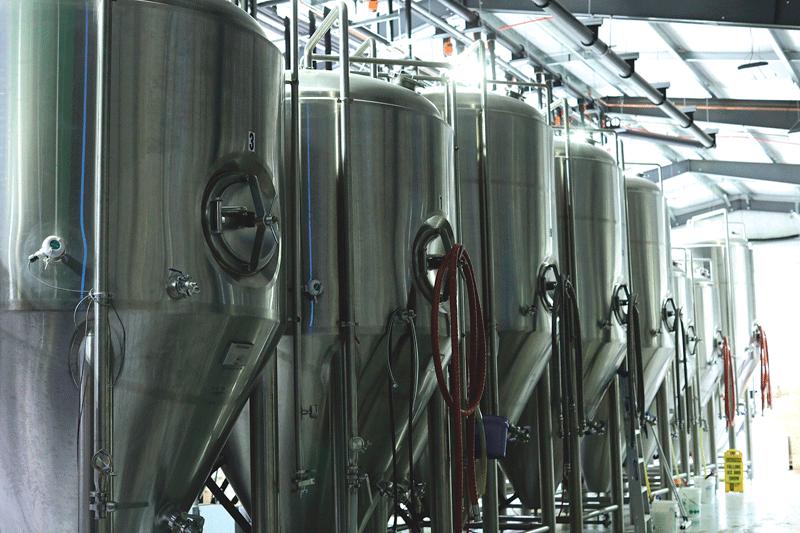
It’s a vibe he, Lanier, and Goudreau try to maintain among their employees as well.
“We want to make sure everyone is happy and friendly and can answer questions and give people what they need. We want this to be more than just a place to come get beer — we want it to be an experience, and a good experience. That’s really important to us, and I think that started from the beginning, when they’d walk into the red barn in Brimfield, put a record on the record player, sit on the couch next to the pot-belly stove, and wait for their beer to get poured. I want to give everyone that vibe here, and I’m hoping that vibe comes back twofold or even tenfold in Charlton.”
Climbing Higher
When the founders first petitioned the state for a brewery license, they had to list a company name, and went through a few rustic-sounding options to match their surroundings.
“We thought maybe Red Barn Brewing, or Brimfield Brewing,” Rohan said. “Well, Damien had this beautiful treehouse in one of the trees right next to the brewery. We realized it had to be Tree House Brewing.”
The company’s logo — a treehouse stylized in a whimsical, flowing manner — has become a common sight on car bumpers throughout the Quaboag region, which he finds gratifying. “I can drive down the road and see the sticker in front of me and know they’re coming from the brewery or have been there. It’s recognizable.”
And it all started with a wife’s gift, a tasting party — and an idea.
“We’re riding a wave that is bigger than any of us imagined, for sure,” Lanier told BusinessWest. “We love Tree House — the beer, the community, the philosophy, and the brand — and our goal every day is to wake up and work our tails off to meet the very high standards we set for ourselves before we ever brewed a beer.”
In short, he concluded, “if the beer is good, and the attitude is right, everything else will fall into place.”
Joseph Bednar can be reached at [email protected]



